Differentiating from your next competitor was never easy in the world of real estate.
The trend is changing, with more and more buyers and renters beginning their property searches online.
Digital marketing is a must for success in this business.
Among many tools, Google Ads for real estate is one of the most powerful ways to grab potential clients at the right time and on the right spot.
But how exactly can Google Ads help you generate leads, increase visibility, and grow your real estate business?
This article will guide you through everything you need to know about using Google Ads for real estate, starting with why this platform is a game-changer for real estate marketing.
- Why Use Google Ads for Real Estate Marketing?
- Setting Up Your First Google Ads Campaign for Real Estate
- Optimizing Google Ads for Real Estate Success
- Google Ads Features That Benefit Real Estate Marketing
- Measuring and Optimizing Your Real Estate Google Ads Campaigns
- Maximizing Real Estate Success with Google Ads
- Commonly Asked Questions About Google Ads for Real Estate
Why Use Google Ads for Real Estate Marketing?
Effective marketing of your real estate business requires more than just flyers and billboards.
Living in a digital-first world, you have to be where your prospects are searching—and that’s on Google.
With billions of searches happening daily, Google Ads for real estate captures the attention of people actively searching for properties or real estate services.
But why should you consider Google Ads as your go-to tool for real estate marketing?

A real estate professional leveraging digital tools and analytics to enhance online advertising in a modern office setting.
The Importance of Online Advertising in Real Estate
Real estate is one of the most competitive industries, and having an online presence is no longer optional.
Prospects of all kinds begin their house searches online via Google with search queries such as ‘homes for sale near me’ or ‘best real estate agent in [city name].’ With Google Ads for real estate, you ensure that your business is right at the top when these prospects look for what you have to offer.
Measurable online advertising means it will let you know just how many clicks, leads, and conversions your campaigns drive.
This level of transparency is invaluable for making data-driven decisions and optimizing your marketing efforts over time.

A representation of Google Ads effectively targeting potential buyers with property listings and analytics tools.
How Google Ads Can Attract Potential Buyers
Google Ads for real estate gives you access to tools and features specifically designed to attract high-intent leads.
For instance, using targeted keywords ensures that your ads appear only to those who are genuinely interested in buying or renting properties.
Besides that, you can also target ads demographically, geographically, and by behavior, making sure that your budget hits the right target.
Another advantage is a range of available ad formats.
From search ads that appear directly on Google’s search results to display ads that showcase visually appealing property images, Google Ads enables you to create campaigns that resonate with different types of audiences.
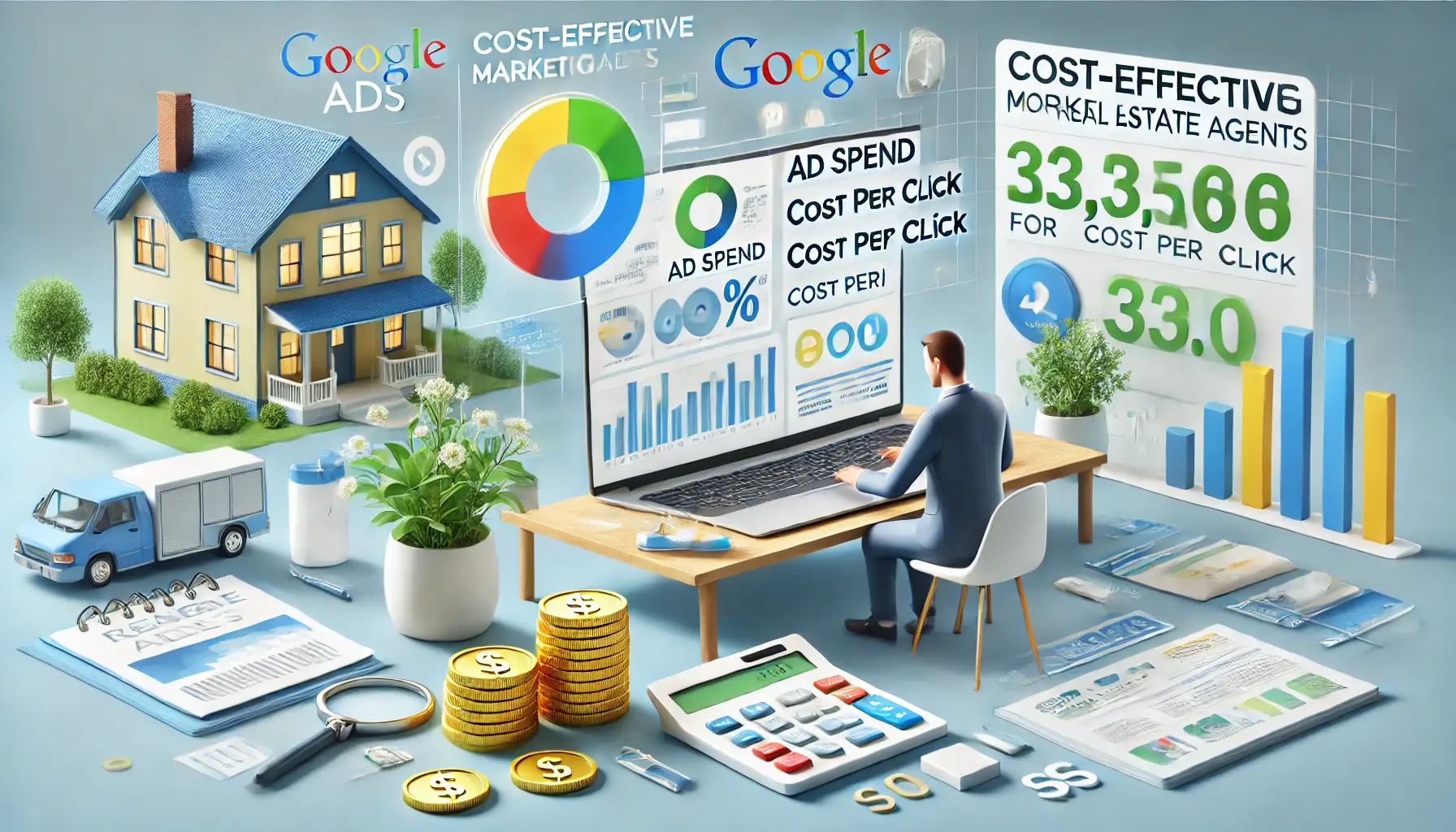
A depiction of cost-effective strategies for real estate marketing using digital tools and analytics.
Cost-Effective Marketing for Real Estate Agents
One of the biggest misconceptions about Google Ads for real estate is that it’s expensive.
In reality, the platform allows you to set your own budget, giving you complete control over your spending.
You pay only when someone clicks on your ad; hence, it is rather economical compared with traditional methods of advertisement.
By carefully selecting keywords and optimizing your campaigns, you can achieve a high return on investment (ROI) even with a modest budget.
Additionally, tools like Google Ads’ performance tracking and A/B testing allow you to refine your campaigns for better results over time, ensuring you get the most out of your investment.

A vibrant representation of achievement in real estate marketing through successful Google Ads campaigns.
Success Stories of Real Estate Campaigns with Google Ads
Many real estate professionals have seen incredible success by integrating Google Ads for real estate into their marketing strategies.
For example, some agencies have increased their leads in a matter of months by running highly targeted campaigns on specific neighborhoods or property types.
These success stories outline how Google Ads has transformed their business and can assist you in standing out in a very competitive real estate market.
Whether you are an experienced real estate professional or a newcomer to the market, Google Ads holds a special place in bringing effectiveness to growing your business.
The right strategies will help you attract more leads, close more deals, and build a strong online presence to drive long-term success.
Google Ads is essential for real estate professionals as it ensures your business is visible to potential buyers actively searching online. With tools to track leads and conversions, it provides data-driven insights for continuous optimization.

A detailed representation of setting up a Google Ads campaign for real estate, highlighting the workspace and digital tools.
Setting Up Your First Google Ads Campaign for Real Estate
Setting up your first Google Ads campaign for real estate can be a bit intimidating, but it really is not that bad when you break it down into step-by-step components.
By following a structured approach, you can create campaigns that generate quality leads, maximize your ROI, and ensure your marketing dollars are spent wisely.

A professional workspace showcasing the process of creating a Google Ads account for real estate marketing.
Creating a Google Ads Account for Real Estate Marketing
To begin, you’ll need to create a Google Ads account if you don’t already have one.
Start by visiting the Google Ads website and clicking on ‘Start Now.’ You’ll be guided through setting up your account by providing details such as your email address, business name, and website URL.
Make sure you select the ‘Expert Mode’ option to unlock advanced features that are particularly beneficial for real estate marketing.
Once your account is set up, connect it to your website using Google Tag ManagerA tool by Google that helps manage and deploy marketing tags on a website without modifying the code. or Google AnalyticsA web analytics service by Google for tracking and reporting website traffic and user behavior..
This step is essential for tracking conversions and understanding how users interact with your site after clicking on your ads.

A professional environment showcasing the selection of campaign types for achieving real estate marketing goals.
Choosing the Right Campaign Type for Your Goals
Google Ads for real estate offers various campaign types, but not all are suitable for real estate marketing.
The most effective options include:
- Search Campaigns: These are text-based ads that appear on Google’s search results page when users search for specific keywords, like ‘real estate for sale in [city].’
- Display Campaigns: These visually rich ads appear on websites and apps within Google’s Display Network, making them ideal for showcasing property photos.
- Local Campaigns: Perfect for promoting open houses or specific neighborhoods, these campaigns target users based on their location.
- Video Campaigns: Use these to run engaging property tour videos on YouTube and other Google-affiliated platforms.
Choose the campaign type that aligns with your marketing goals, whether it’s increasing brand awareness, generating leads, or driving foot traffic to an open house.

A professional environment depicting the strategic analysis of target audience and geographic location for real estate marketing.
Defining Your Target Audience and Geographic Location
Targeting is a critical component of a successful Google Ads campaign for real estate.
Begin by defining your ideal audience based on factors like:
- Demographics: Age, income level, and family status can help you target homebuyers or renters more effectively.
- Interests and Behaviors: Focus on users who have shown interest in real estate, home improvement, or related topics.
- Geographic Location: Use geo-targeting to focus your ads on specific neighborhoods, cities, or regions where your properties are located.
Additionally, exclude areas that are not relevant to your business to optimize your budget and ensure your ads reach the right audience.

A professional workspace illustrating the analysis of budget and bidding strategies for real estate advertising.
Budgeting and Bidding Strategies for Real Estate Ads
One of the biggest advantages of Google Ads is its flexibility in budgeting.
Set your daily budget according to your overall marketing spend.
For real estate campaigns, a good starting point could be anywhere between $20-50 per day, but this may vary depending on goals and market competition.
Choose a bidding strategy.
For beginners, the best setting to start with is ‘Maximize Clicks’ because it allows Google to automatically set your bids for the most clicks within your budget.
As you gather more data, you can transition to more advanced strategies like ‘Target CPAA bidding strategy in Google Ads where you set a cost per acquisition goal, and Google automatically optimizes bids to achieve it.‘ (Cost Per Acquisition) or ‘Target ROASA bidding strategy in Google Ads that focuses on maximizing return on ad spend by adjusting bids based on target revenue.‘ (Return on Ad Spend) to fine-tune your campaigns for better performance.

A modern office setting illustrating the final steps of launching a successful real estate marketing campaign.
Tips for Successful Campaign Launch
Before launching your campaign, make sure everything is optimized for success.
Here are some tips:
- Use high-quality property images or videos to make your ads visually appealing.
- Write clear and compelling ad copy that highlights unique selling points, such as ‘luxury homes,’ ‘affordable prices,’ or ‘prime locations.’
- Include a strong call-to-action (CTA), like ‘Schedule a Viewing Today’ or ‘Contact Us for More Details.’
- Test multiple ad variations to see which performs best and adjust accordingly.
- Monitor your campaign daily to track performance and make data-driven adjustments.
By following these steps, you’ll be well on your way to launching a successful Google Ads campaign for real estate that attracts high-quality leads and helps grow your business.
Begin with a structured approach: set up an account, connect analytics tools, and choose campaign types aligned with your goals to maximize ROI.
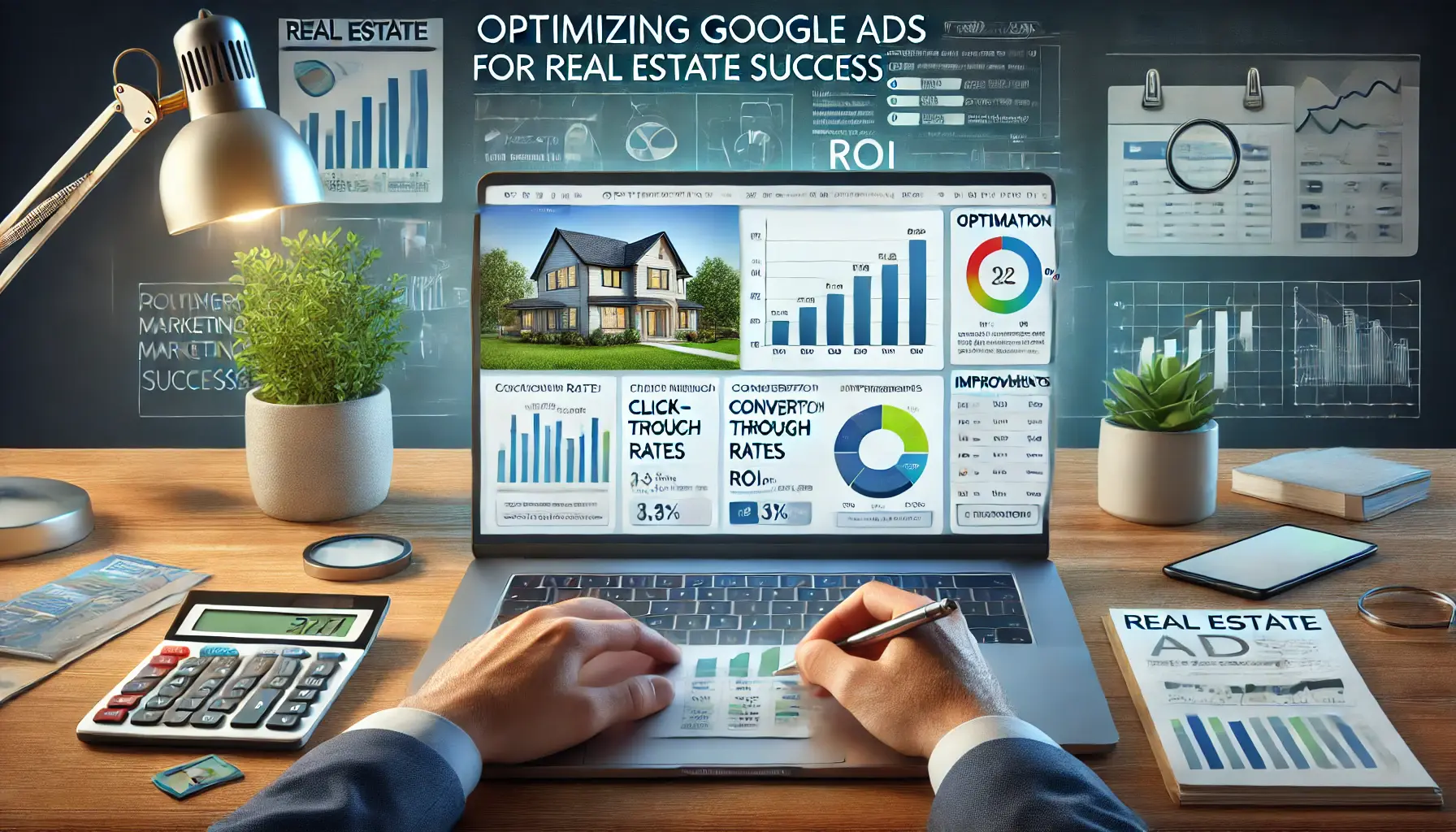
A professional workspace illustrating the process of optimizing Google Ads campaigns for real estate success.
Optimizing Google Ads for Real Estate Success
Just setting up your first Google Ads campaign for real estate is not everything; it does indeed require optimization, both initially and ongoing.
Optimization ensures high performance and lowers the cost per conversion, so you can create better quality leads that could eventually convert into a sale.
Let’s dive into key strategies to help elevate your real estate ads to the next level.
Keywords and Their Use in Real Estate Advertisement
Keywords lie at the heart of any Google Ads campaign.
The appropriate selection of keywords ensures that your ads pop up when people search for properties or services.
Consider focusing on a mix of broad, phrase, and exact match keywords to strike a balance between reach and relevance.
Examples include:
- Broad Match: ‘real estate for sale’ or ‘homes near me.’
- Phrase Match: ‘affordable houses for sale’ or ‘luxury apartments in [city].’
- Exact Match: ‘[specific address] property for sale.’
Use negative keywords to prevent your ads from appearing in irrelevant searches.
For instance, if you specialize in selling homes, you might want to exclude terms like ‘rental properties’ or ‘vacation homes.’

A focused workspace showing the creation of high-converting ad copy for real estate listings, emphasizing key features of properties.
Crafting High-Converting Ad Copy for Real Estate Listings
Your ad copy plays a crucial role in attracting clicks and converting users.
To craft compelling ad copy:
- Highlight Benefits: Showcase unique selling points such as ‘Spacious Family Homes,’ ‘Modern Interiors,’ or ‘Prime Locations.’
- Use Numbers: Include specifics like ‘Starting at $200,000’ or ‘5-Bedroom Homes.’
- Incorporate CTAs: Encourage action with phrases like ‘Schedule a Viewing Today’ or ‘Contact Us for More Details.’
- Match Search Intent: Ensure your copy aligns with the user’s query, making it more relevant and appealing.
Write multiple variations of ad copy to test which resonates most with your audience.
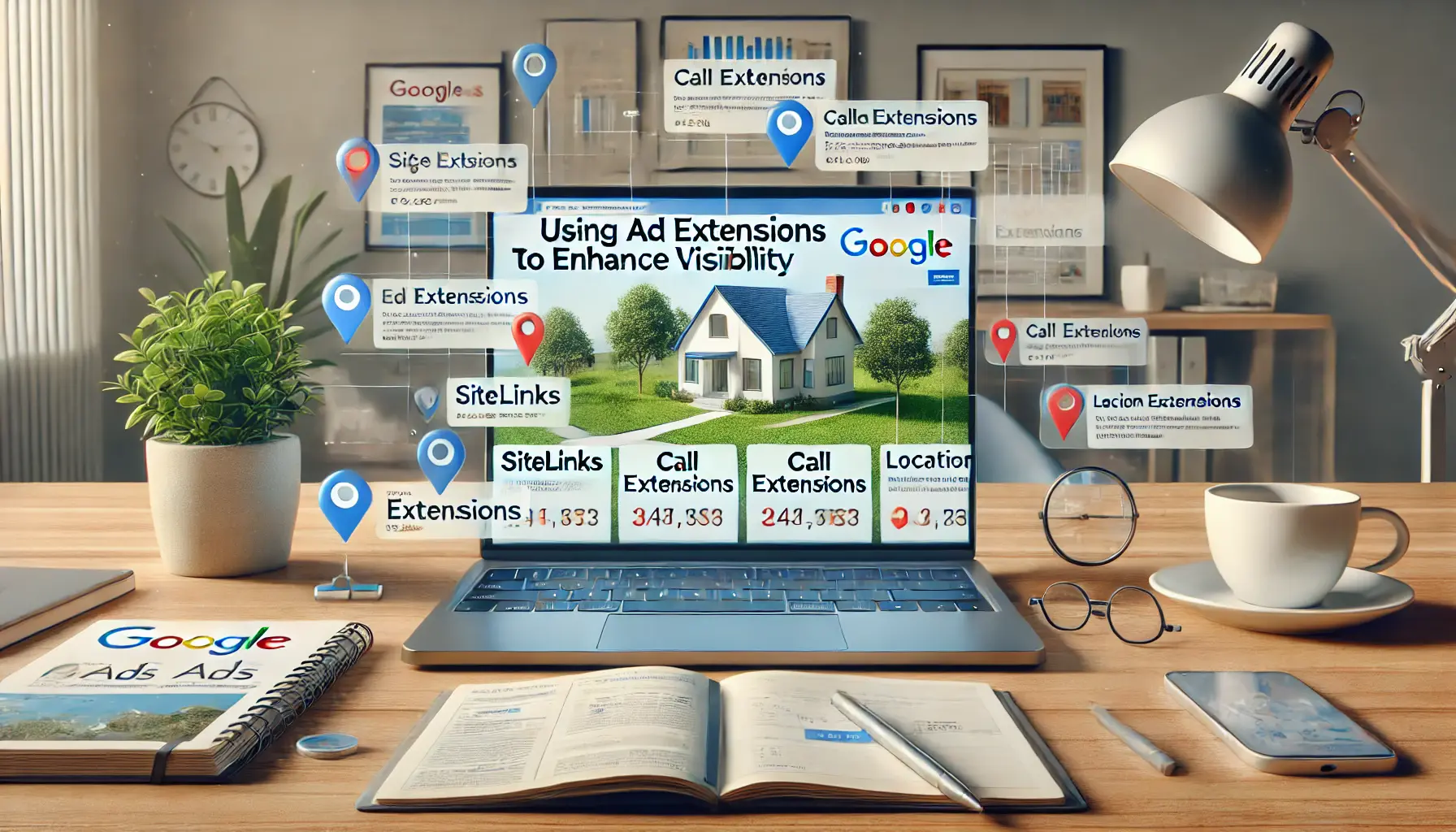
A professional workspace illustrating the use of ad extensions to enhance visibility in Google Ads for real estate marketing.
Using Ad Extensions to Enhance Visibility
Ad extensions are powerful tools for improving your ad’s performance by providing additional information and links.
Some effective ad extensions for real estate marketing include:
- Sitelink Extensions: Direct users to specific pages such as property listings, neighborhood guides, or your contact page.
- Call Extensions: Add a clickable phone number, making it easy for users to contact you directly.
- Location Extensions: Showcase your business address to attract local clients.
- Image Extensions: Display eye-catching property images to increase engagement.
By using ad extensions, you can make your ads more informative and visually appealing, leading to higher click-through rates (CTR).
A professional workspace illustrating A/B testing and performance tracking to optimize Google Ads campaigns for real estate marketing.
A/B Testing and Performance Tracking for Better Results
Testing and tracking are essential for optimizing your Google Ads campaign for real estate.
Conduct A/B testing by creating different ad variations and testing which one performs best.
Test variables to consider include:
- Headlines
- Descriptions
- CTAs
- Ad formats
Monitor key metrics such as CTR, conversion rate, and cost per lead to understand what works best.
Use tools like Google Analytics and the Google Ads dashboard to gain insights into user behavior and make data-driven decisions.
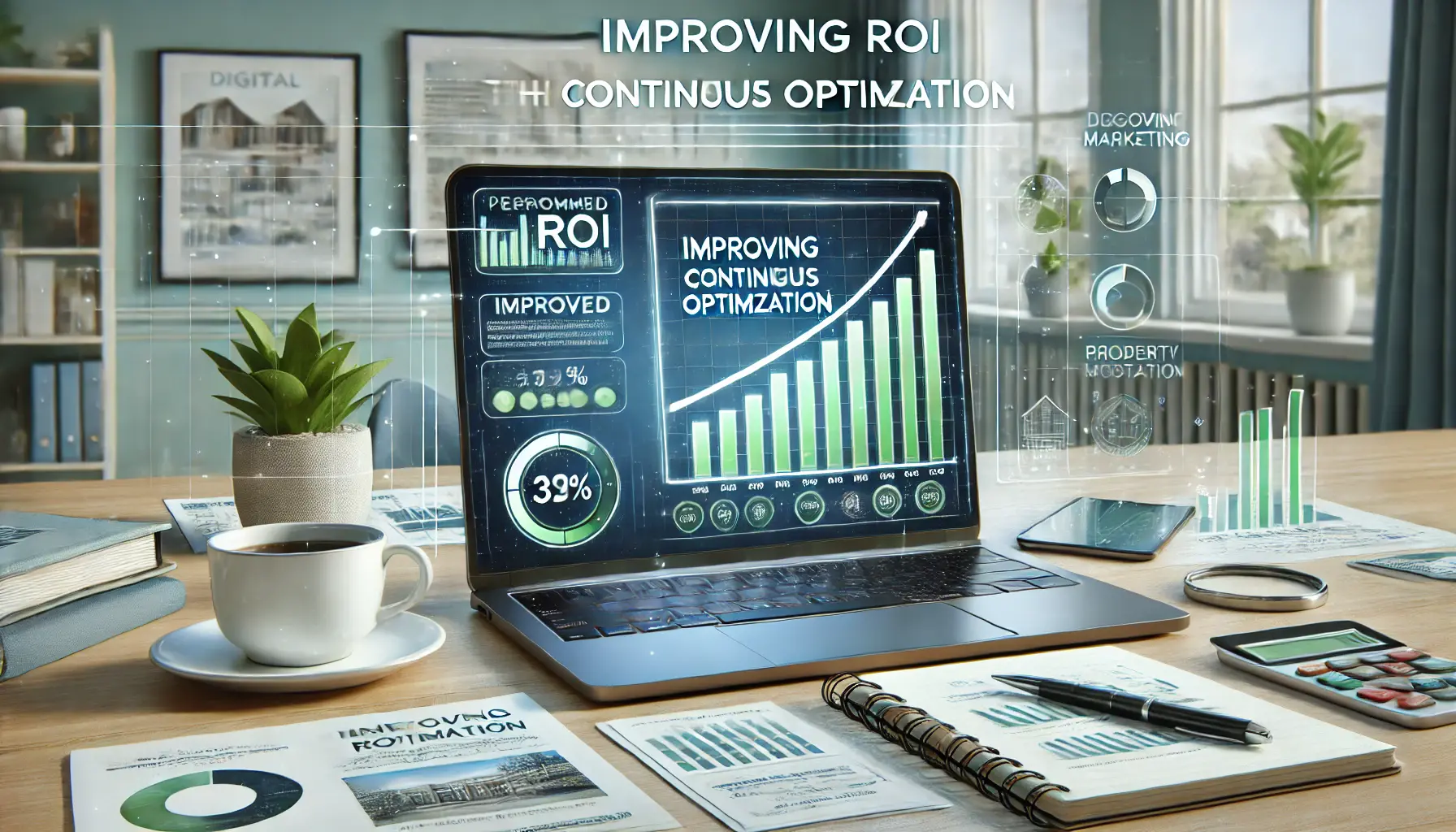
A focused workspace illustrating how continuous optimization leads to improved ROI in real estate marketing.
Improving ROI Through Continuous Optimization
Optimization is an ongoing process.
Regularly analyze your campaigns and make adjustments to improve performance.
Some recommendations include:
- Keep refining your keyword list by adding new, high-performing keywords and removing underperforming ones.
- Adjust bidding strategies based on campaign performance and competition.
- Optimize landing pages to ensure they are user-friendly and align with your ads.
- Use remarketing to re-engage users who visited your website but didn’t convert.
By staying proactive and continuously refining your strategies, you can ensure that your Google Ads campaign for real estate performs at its best, helping you achieve your business goals effectively.
Ongoing optimization is crucial for success. Regularly analyze and refine your campaigns to reduce costs and improve lead quality.
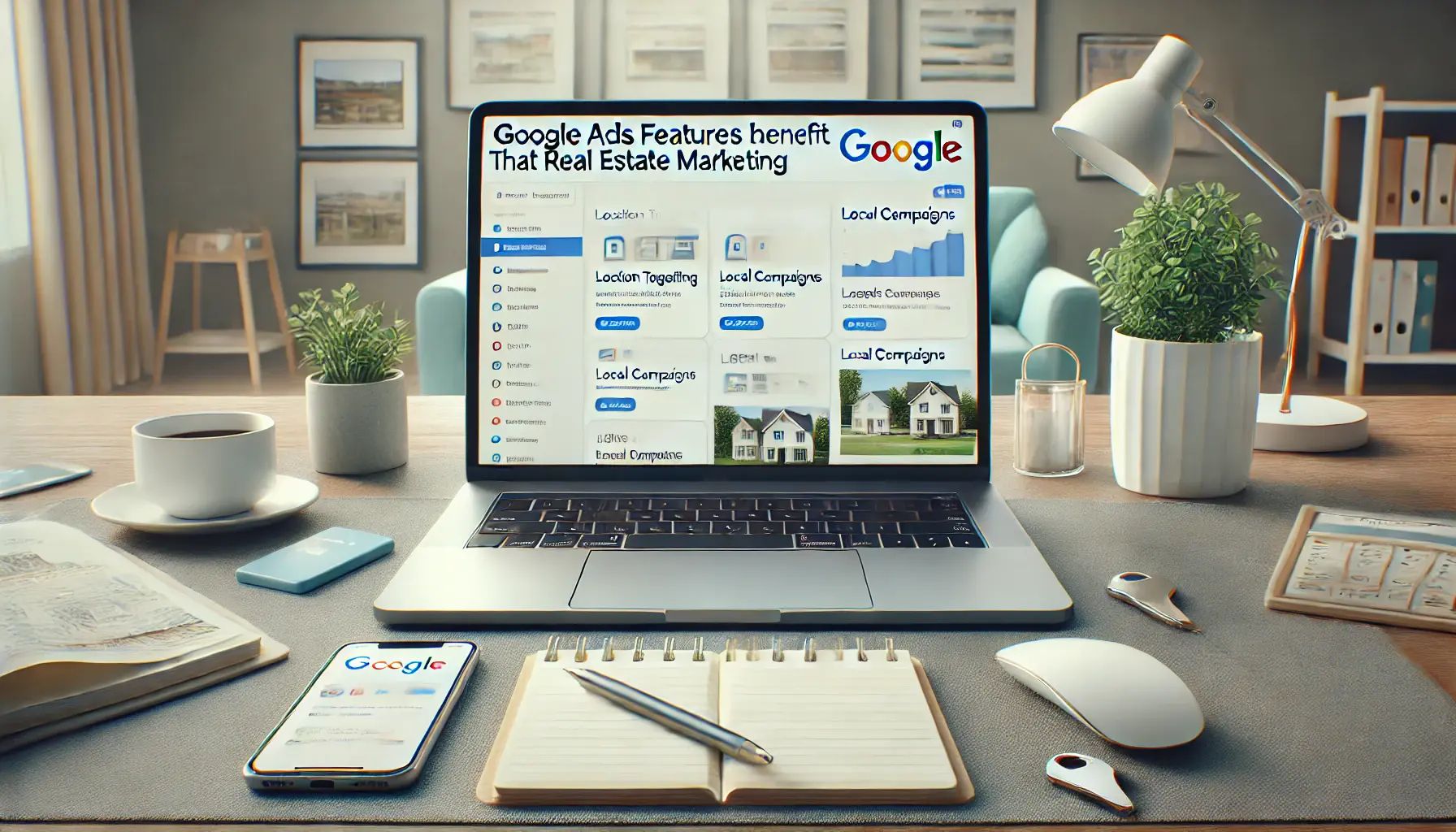
A professional workspace illustrating how Google Ads features, like location targeting and image ads, benefit real estate marketing.
Google Ads Features That Benefit Real Estate Marketing
With so many different features, Google Ads can be incredibly helpful for targeting the right audience in real estate marketing and effectively showcasing properties for better overall campaign performance.
Knowing how to utilize these features can provide your real estate business with an extra advantage.
Let’s explore the most impactful Google Ads features for real estate marketing.
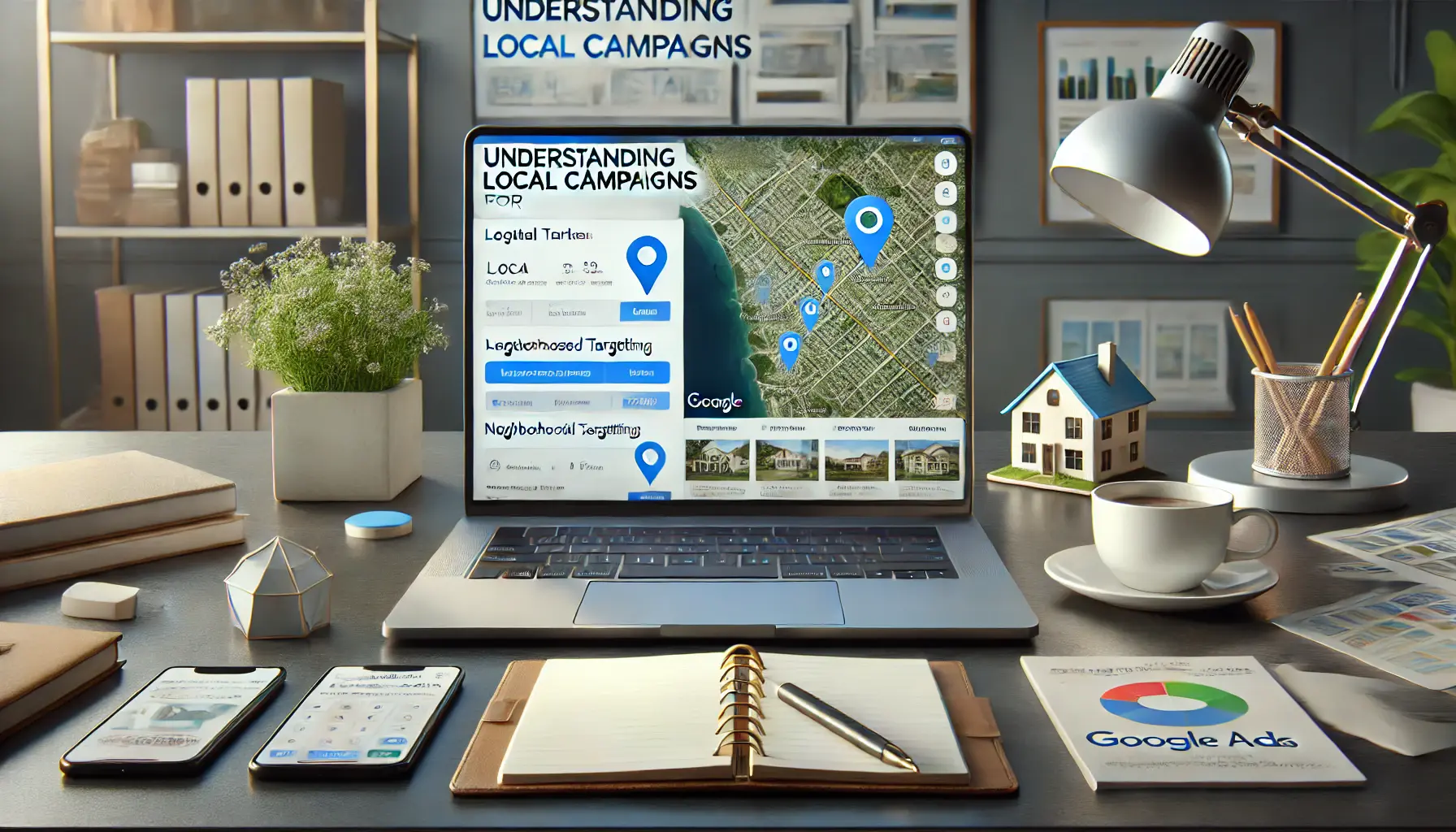
A professional workspace illustrating the setup of local campaigns for real estate marketing, with geographic targeting and property visuals.
Understanding Local Campaigns for Real Estate
Local campaigns are a powerful tool for real estate professionals, especially when promoting open houses or targeting specific neighborhoods.
These campaigns automatically optimize ads across Google platforms like Search, Maps, Display, and YouTube to drive local engagement.
With local campaigns, you can:
- Highlight open houses or property tours with clear call-to-action buttons.
- Direct users to your office or property location via Google Maps.
- Focus on geographic areas with the highest buyer interest.
Local campaigns are particularly effective for attracting buyers who are actively searching for properties in your area.
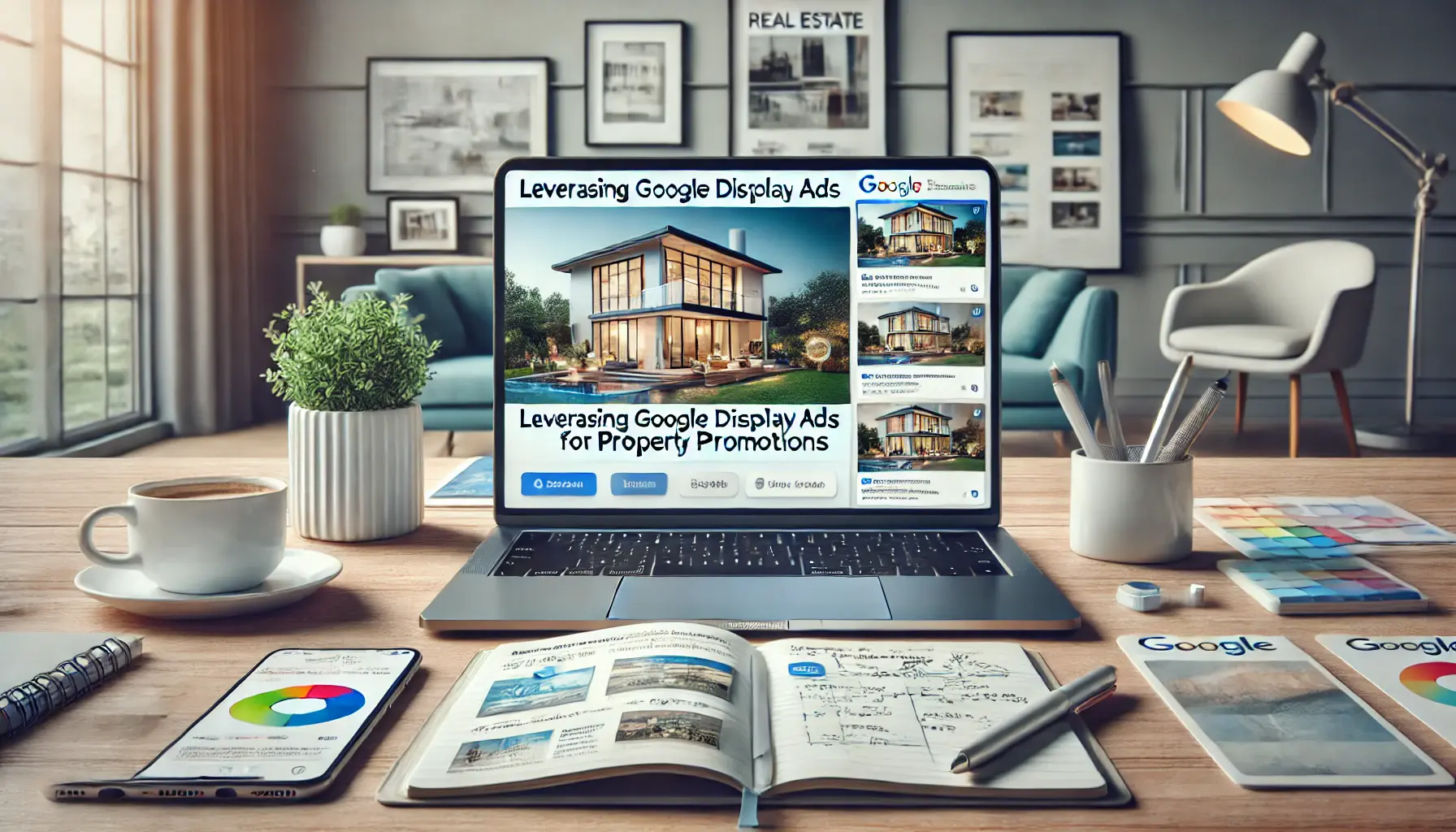
A modern workspace showing the use of Google Display Ads for promoting real estate properties, with rich visuals and property images.
Leveraging Google Display Ads for Property Promotions
Google Display Ads offer a visually engaging way to promote real estate listings.
This capability allows you to showcase high-quality images or videos of your properties on websites and apps in Google’s Display Network.
Benefits of using Display Ads include:
- Reaching a broader audience beyond search results.
- Creating visually appealing ads with property photos or 360-degree virtual tours.
- Targeting specific demographics or interests, such as ‘luxury home buyers’ or ‘first-time buyers.’
By leveraging Display Ads, you can capture the attention of potential buyers and generate interest in your listings.

A professional workspace illustrating the use of Google’s Call Ads to maximize leads in real estate marketing.
Maximizing Leads with Google’s Call Ads
Call Ads are an excellent feature for real estate agents looking to generate direct leads.
These ads encourage users to call your business directly from the search results, making it easy for buyers to contact you.
Benefits include:
- Immediate connection with interested buyers or renters.
- Higher conversion rates due to direct communication.
- Customizable ad copy to highlight specific properties or services.
To maximize the impact of Call Ads, ensure your phone number is active during business hours and that you’re prepared to respond promptly to inquiries.

A professional workspace illustrating the use of retargeting in real estate marketing to re-engage potential buyers.
Using Retargeting to Re-Engage Interested Buyers
Retargeting, also known as remarketingA digital marketing strategy that targets users who have already interacted with your website or app., is a powerful strategy for re-engaging users who have previously interacted with your website or ads.
Google Ads enables you to set up a retargeting campaign so users see your ads while browsing other websites or platforms.
This feature is particularly important in real estate since buyers often require multiple touchpoints before making a decision.
Benefits of retargeting include:
- Keeping your properties top of mind for potential buyers.
- Encouraging users to return to your website to view listings.
- Targeting users based on their specific interests, such as properties they’ve viewed.
Retargeting ensures that you stay connected with high-potential leads and increase the likelihood of conversions.

A professional workspace illustrating the impact of Google Maps Ads in increasing real estate visibility through location-based targeting.
The Impact of Google Maps Ads on Real Estate Visibility
Google Maps Ads are an essential feature for real estate professionals focusing on local visibility.
These ads appear directly on Google Maps, making it easy for users to locate your properties or office location.
Key benefits include:
- Capturing local buyers who are actively searching in specific areas.
- Directing people clearly to open houses or property tours.
- Increasing your presence in competitive real estate markets.
With Google Maps Ads, you can extend your local presence and engage buyers ready to take the next step.
By effectively leveraging these features of Google Ads for real estate, you can create a comprehensive marketing campaign aimed at encouraging engagement, generating leads, and growing your real estate business.
Google Ads offers features like local campaigns, display ads, and retargeting, all tailored to improve visibility and engagement for real estate professionals.
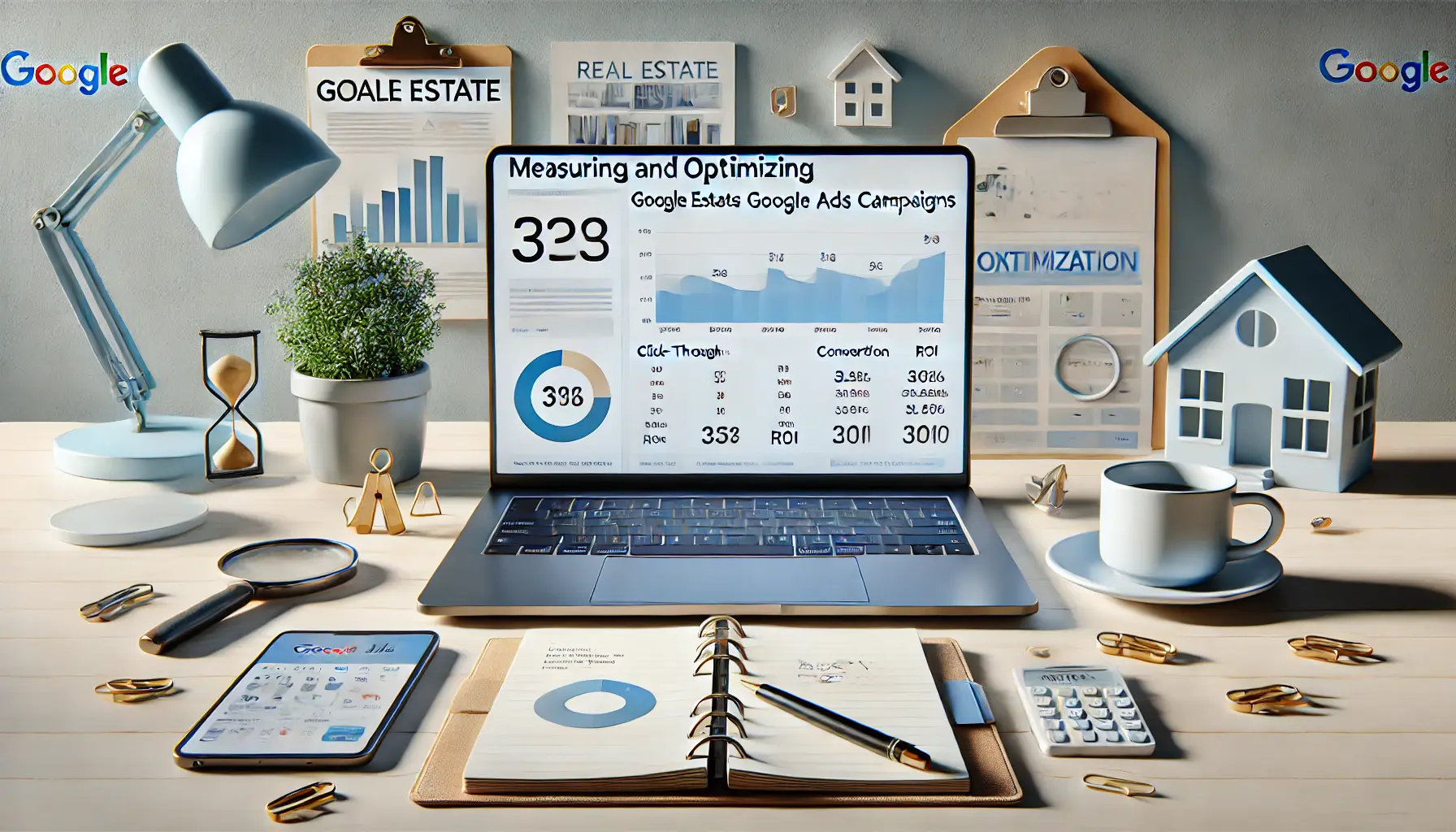
A professional workspace illustrating the process of measuring and optimizing Google Ads campaigns for real estate marketing.
Measuring and Optimizing Your Real Estate Google Ads Campaigns
Implementing a Google Ads real estate campaign is just the beginning.
For long-term success, you need to measure your campaign’s performance and regularly enhance your strategies.
Data will enable you to gauge what works and how to leverage key insights to optimize your campaigns and ensure maximum ROI.
Here’s how you can effectively measure and improve your real estate campaigns.
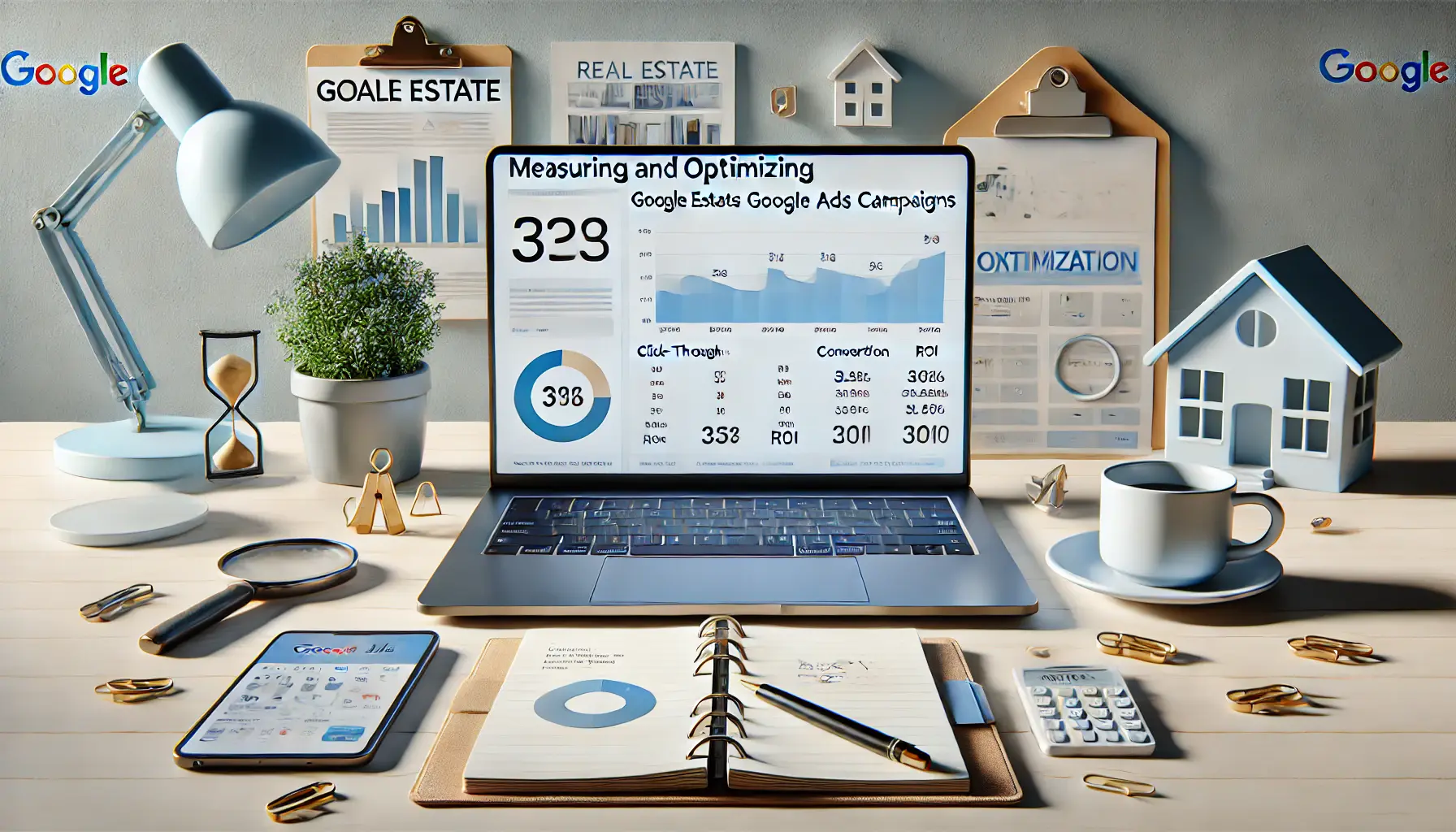
A professional workspace illustrating the process of measuring and optimizing Google Ads campaigns for real estate marketing.
Key Performance Metrics for Real Estate Ads
Tracking the right metrics is crucial to evaluating the success of your Google Ads campaign.
Some key performance indicators (KPIs) to focus on include:
- Click-Through Rate (CTR): Indicates how effective your ads are at capturing user interest. A high CTR suggests your ad copy and targeting are working well.
- Cost Per Click (CPC): Measures how much you’re paying for each click. Lower CPCs mean better cost efficiency.
- Conversion Rate: Tracks the percentage of users who take desired actions, such as filling out a form or scheduling a property tour.
- Cost Per Conversion: Calculates the cost of acquiring a lead or customer. Lower CPC indicates better campaign performance.
- Impression Share: Shows how often your ads appear compared to your competition, helping you gauge visibility in your target market.
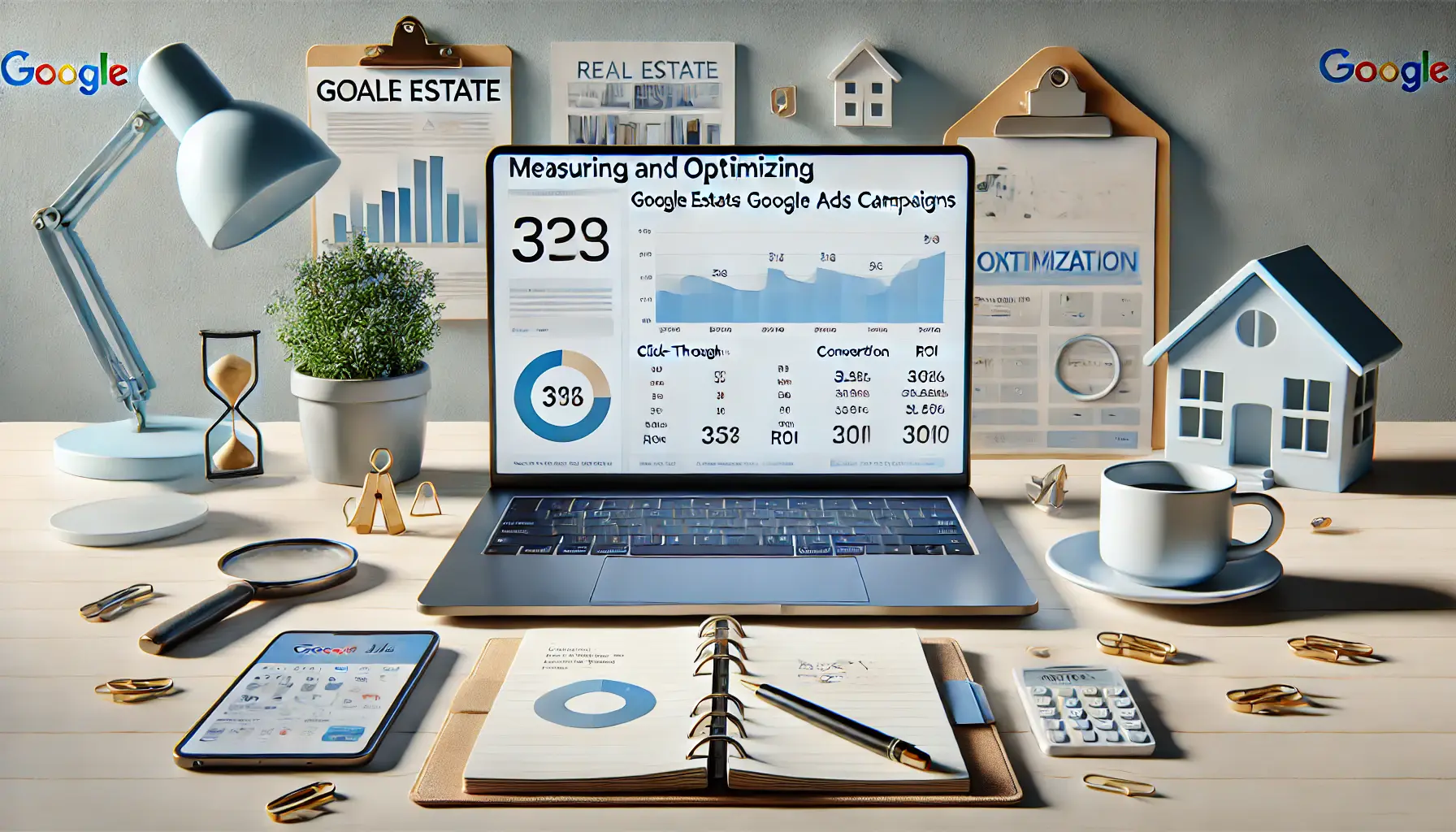
A professional workspace illustrating the process of measuring and optimizing Google Ads campaigns for real estate marketing.
Analyzing Click-Through Rates and Conversion Rates
Your CTR and conversion rate are among the most critical metrics for measuring ad effectiveness.
To improve these rates:
- Refine your keywords to target highly relevant search terms.
- Create compelling and specific ad copy with clear calls-to-action (CTAs).
- Test different ad formats, such as responsive search ads and display ads, to see which performs better.
- Ensure your landing pages are optimized for user experience and align with your ad messaging.
Regularly reviewing and adjusting your campaigns based on CTR and conversion rate data will help you identify high-performing strategies and eliminate underperforming ones.
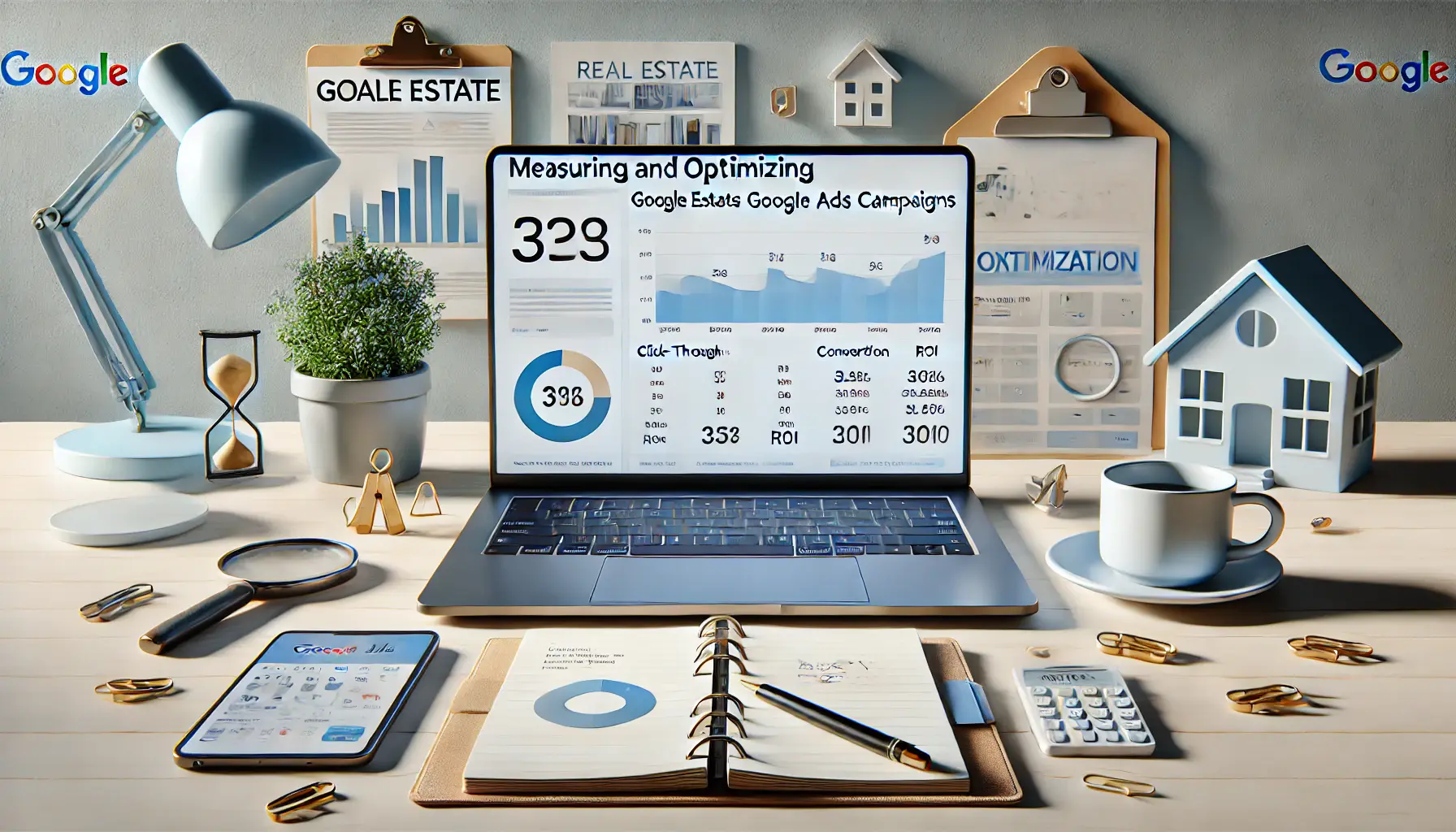
A professional workspace illustrating the process of measuring and optimizing Google Ads campaigns for real estate marketing.
Improving ROI with Data-Driven Adjustments
Improving ROI requires a proactive approach to campaign optimization.
Use the data from Google Ads to make informed decisions, such as:
- Focusing more budget on high-converting keywords and ads.
- Lowering bids on low-performing keywords or excluding them altogether.
- Experimenting with advanced bidding strategies like ‘Target ROAS’ or ‘Enhanced CPC.’
- Adjusting ad scheduling to target users during peak hours.
These adjustments, based on campaign data, can significantly improve your cost efficiency and overall campaign performance.
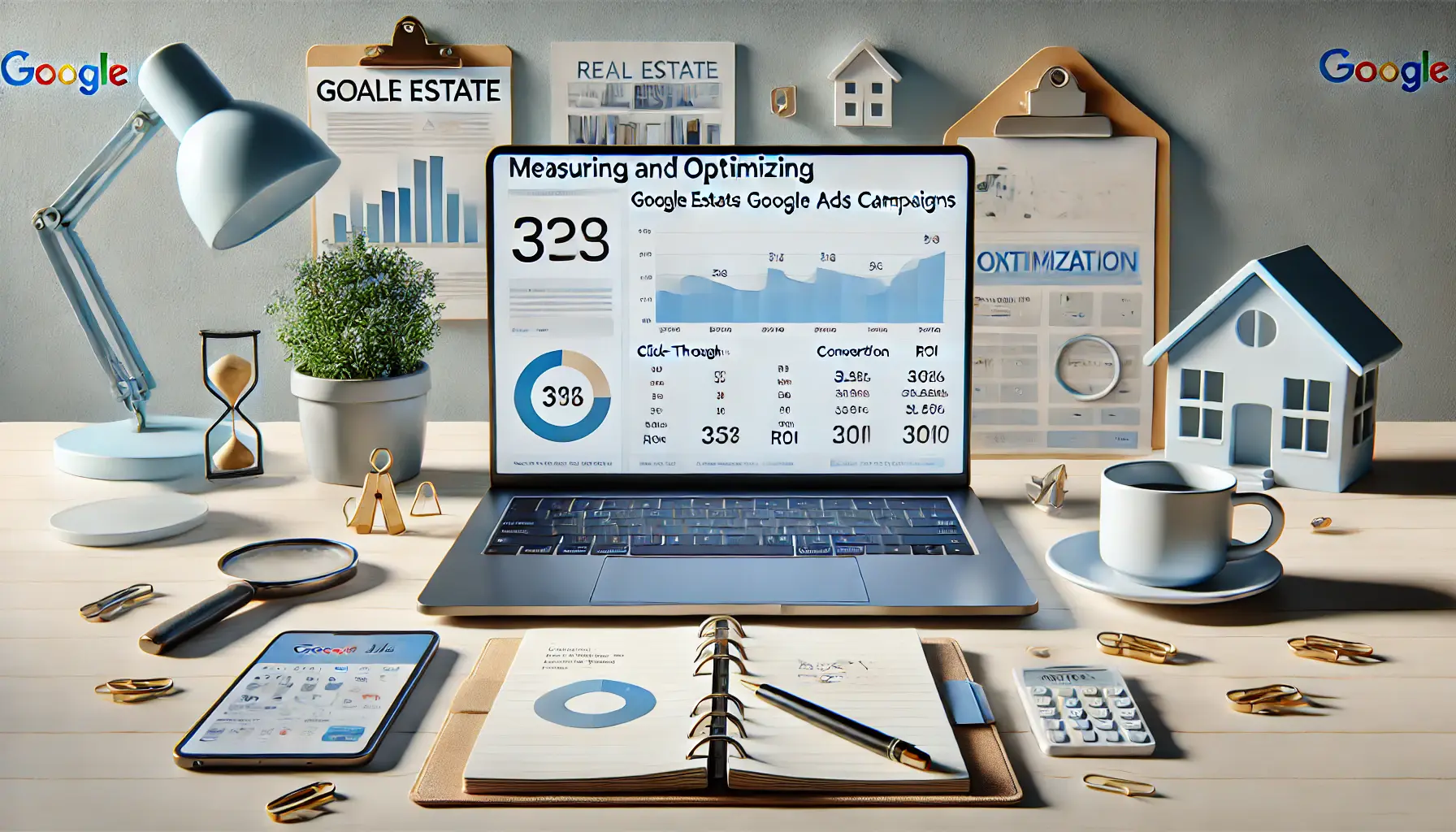
A professional workspace illustrating the process of measuring and optimizing Google Ads campaigns for real estate marketing.
Integrating Google Analytics for Deeper Insights
Google Analytics is a powerful tool for gaining deeper insights into your campaign’s performance.
By integrating Google Analytics with your Google Ads campaign, you can track what users do on your website once they click your ads.
Key insights you can gather include:
- How users navigate through your website.
- The time spent on property listings or specific pages.
- The bounce rate of your landing pages.
- Completion of goals, such as form submissions or video views.
These insights help you fine-tune your landing pages, improve user experience, and boost conversion rates.
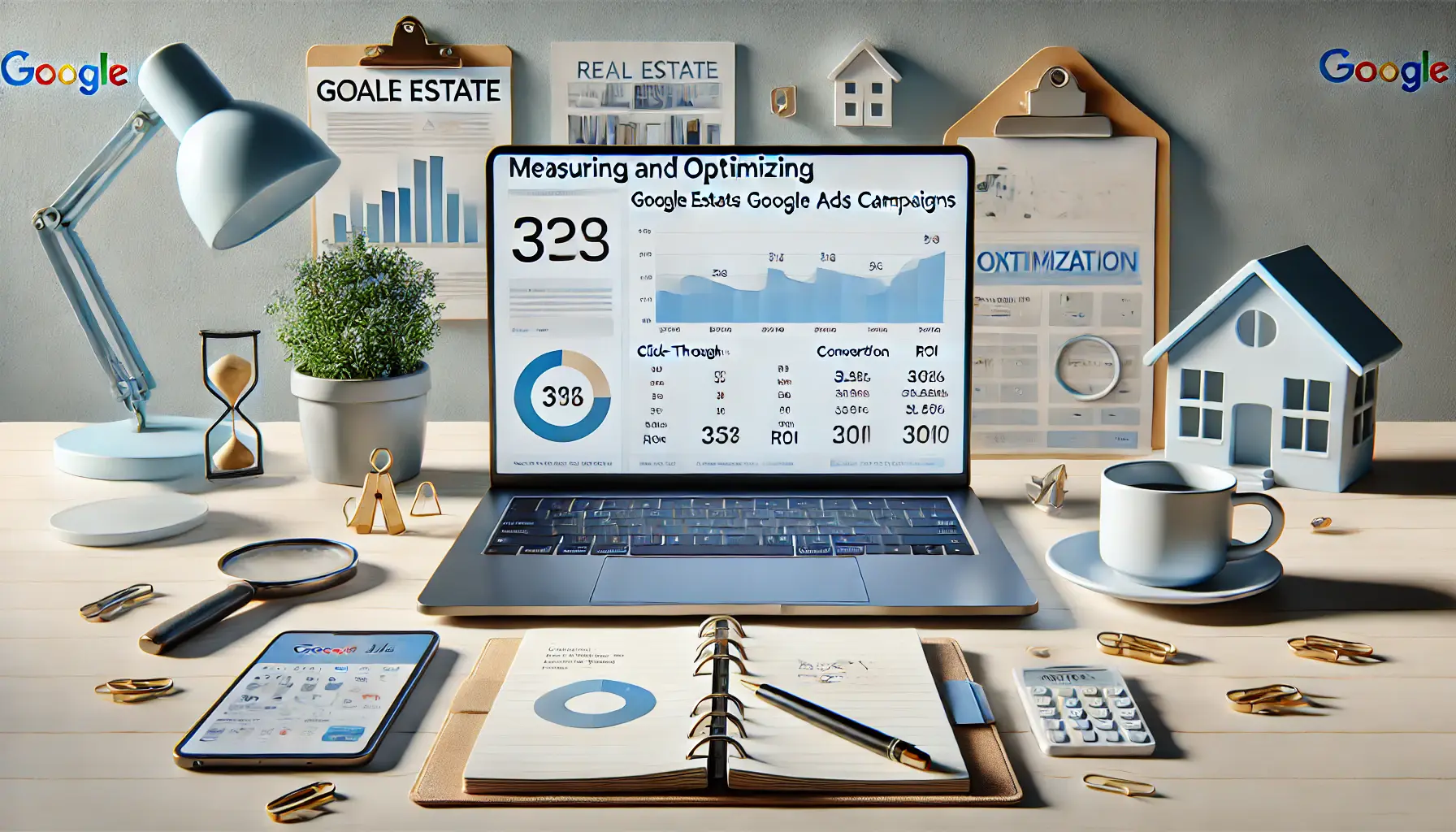
A professional workspace illustrating the process of measuring and optimizing Google Ads campaigns for real estate marketing.
Common Mistakes to Avoid in Real Estate Google Ads
Even with the best intentions, mistakes can hinder the success of your campaigns.
Avoid these common pitfalls:
- Using irrelevant or overly broad keywords that waste your ad budget.
- Failing to set clear and measurable goals for your campaigns.
- Neglecting to regularly test and optimize ad copy and landing pages.
- Not leveraging ad extensions to provide additional information and value.
- Ignoring mobile optimization, as many users search for properties on their phones.
By being mindful of these mistakes and proactively addressing them, you can create more effective campaigns and achieve your real estate marketing goals.
With performance measured, data-driven decisions taken, and strategies continuously refined, your real estate Google Ads campaign will consistently deliver excellent results, helping you grow your business effectively.
Track metrics like CTR, CPC, and conversion rates to evaluate performance. Use data-driven adjustments to maximize ROI and campaign effectiveness.
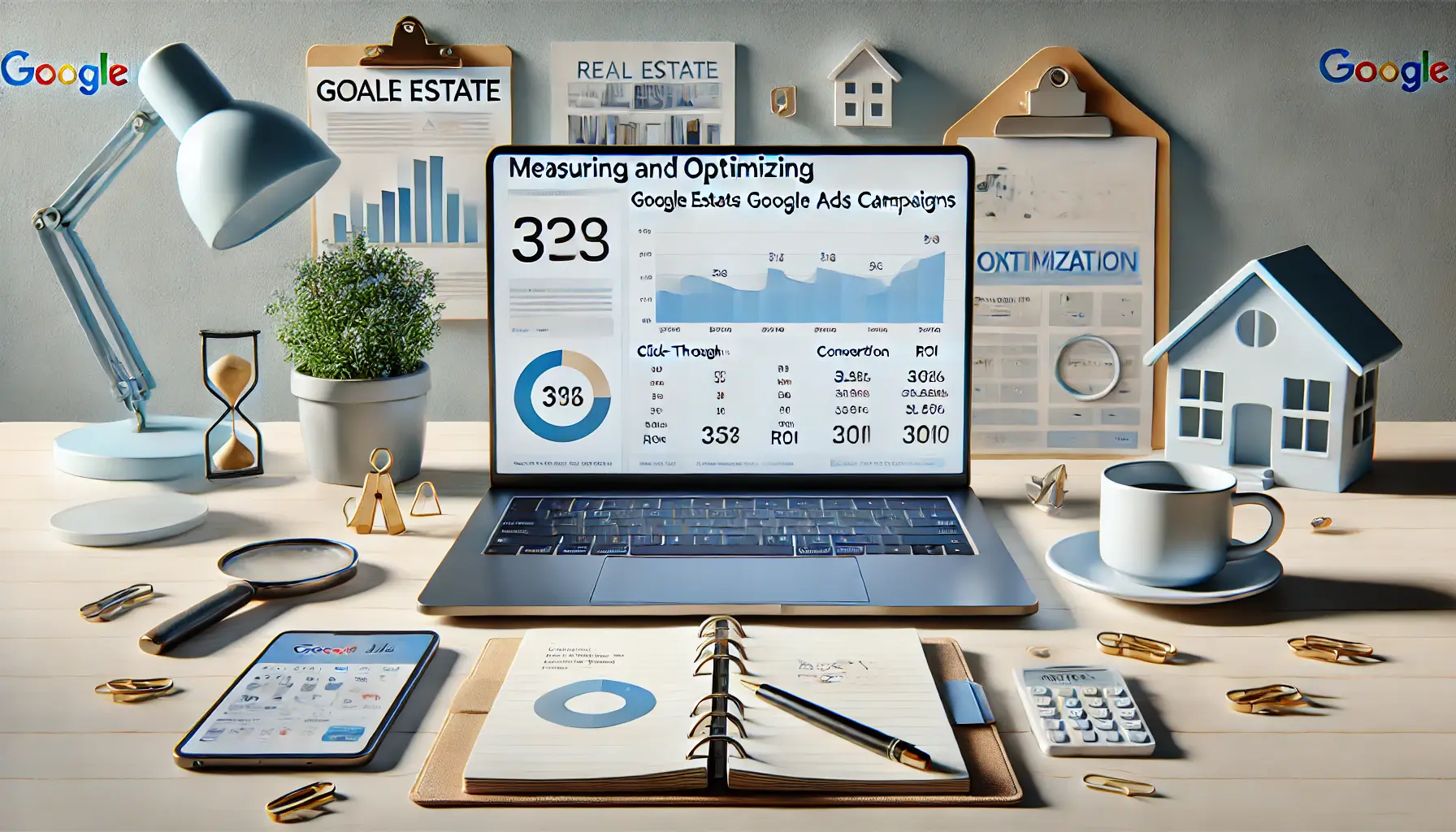
A professional workspace illustrating the process of measuring and optimizing Google Ads campaigns for real estate marketing.
Maximizing Real Estate Success with Google Ads
Google Ads is a must-have channel for any real estate marketing strategy because of its comprehensive features that enable targeting the right audience, effective presentation of properties, and driving tangible results.
With the tips shared in this article, you will be able to optimize your campaigns, improve performance, and achieve your business goals.
Let’s recap the key takeaways and understand how to apply them to maximize success.
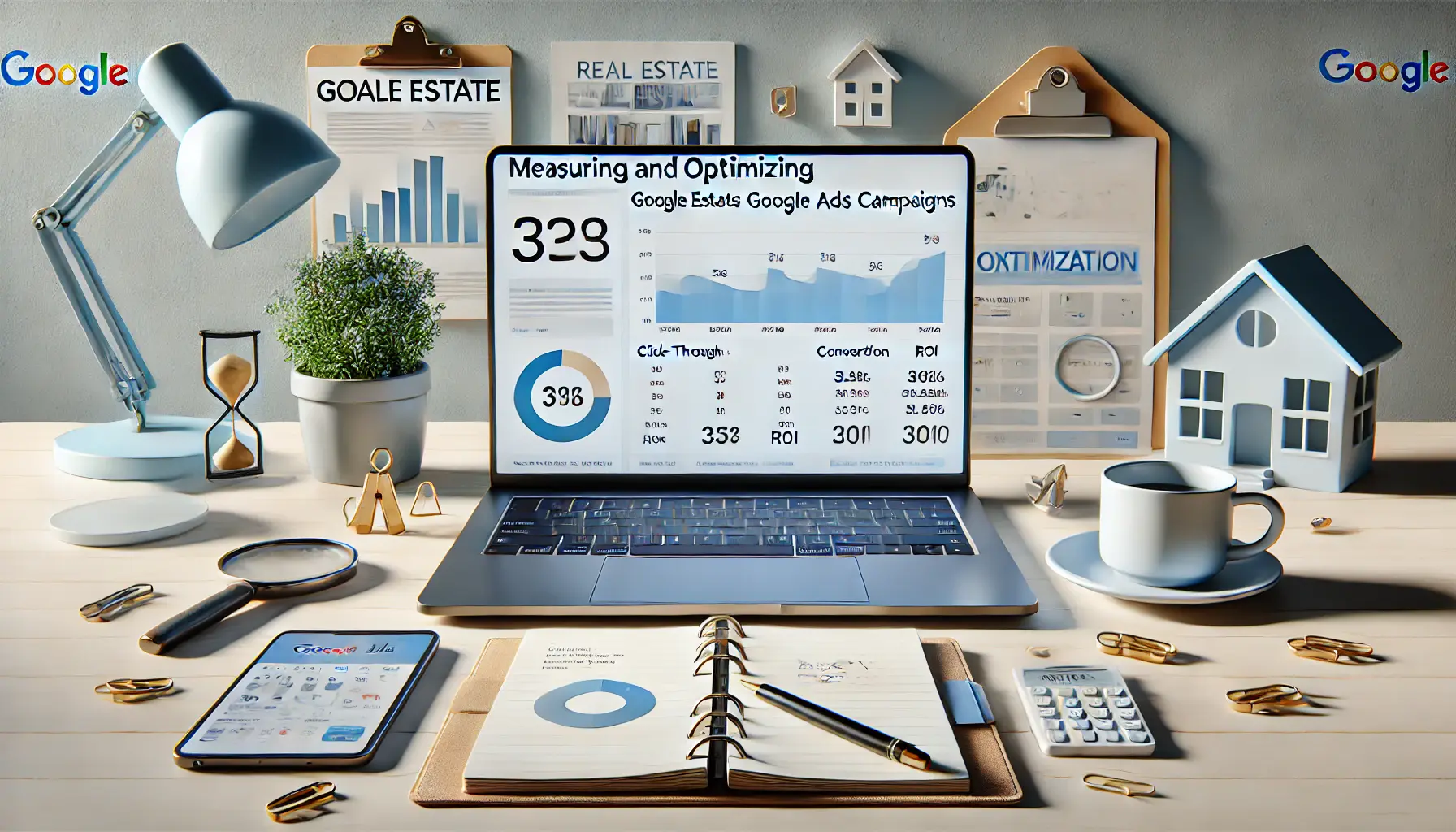
A professional workspace illustrating the process of measuring and optimizing Google Ads campaigns for real estate marketing.
The Power of Google Ads for Real Estate
Google Ads provides unparalleled reach and customization for real estate professionals.
Whether through search campaigns that capture user intent, display ads that visually engage, or local campaigns that boost visibility, this platform ensures you connect with potential buyers and renters at the right time.
With features like retargeting and ad extensions, you can create a personalized experience that enhances engagement and drives conversions.
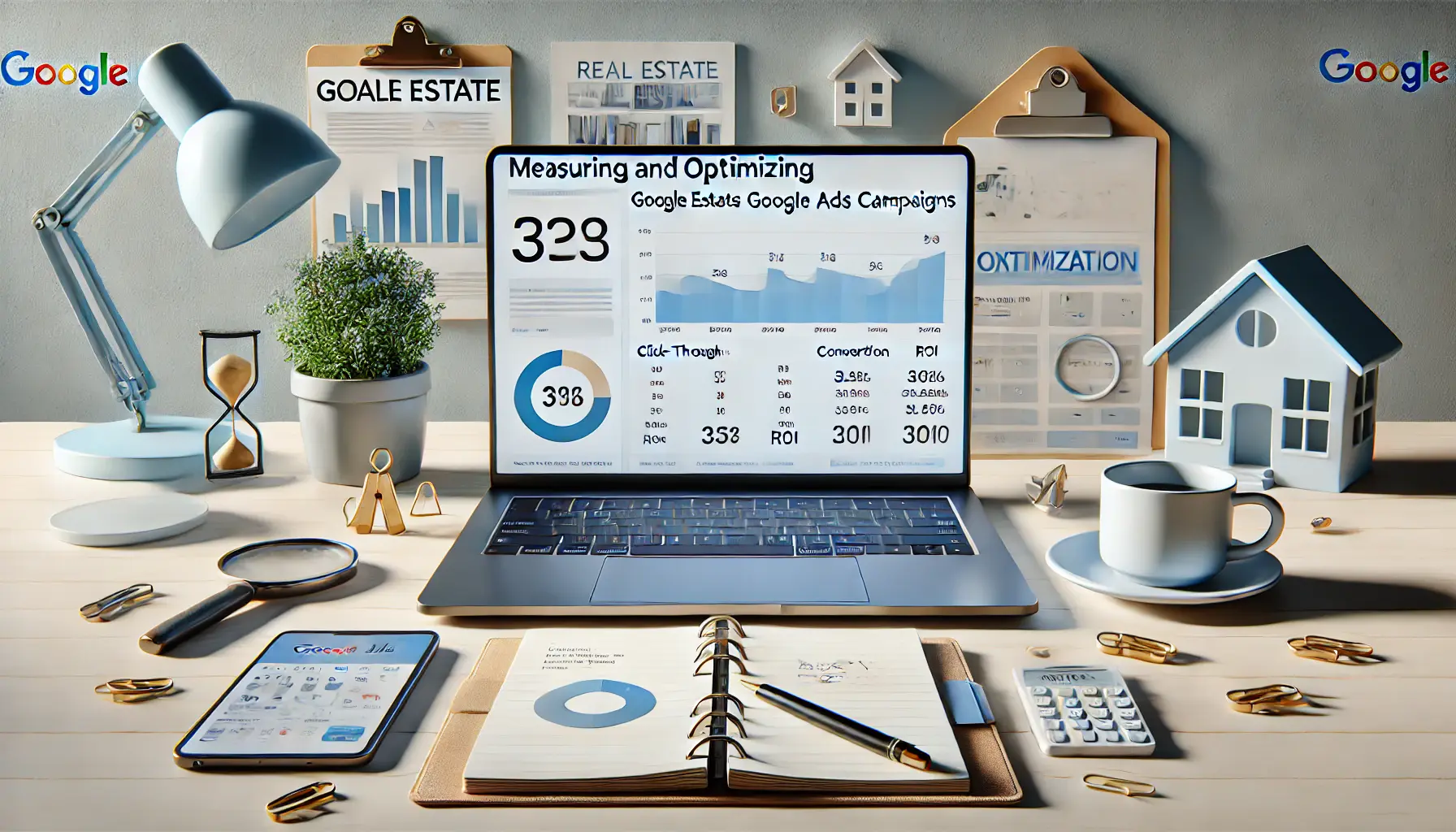
A professional workspace illustrating the process of measuring and optimizing Google Ads campaigns for real estate marketing.
Optimizing Campaign Performance
Optimization is key to long-term success.
By selecting the right keywords, crafting high-converting ad copy, and leveraging tools like A/B testing and Google Analytics, you can continuously refine your campaigns.
Key steps to optimize include:
- Focusing on relevant and high-performing keywords.
- Using compelling ad copy with clear calls-to-action (CTAs).
- Experimenting with different ad formats and strategies.
- Tracking metrics like CTR, CPC, and conversion rates to make data-driven decisions.
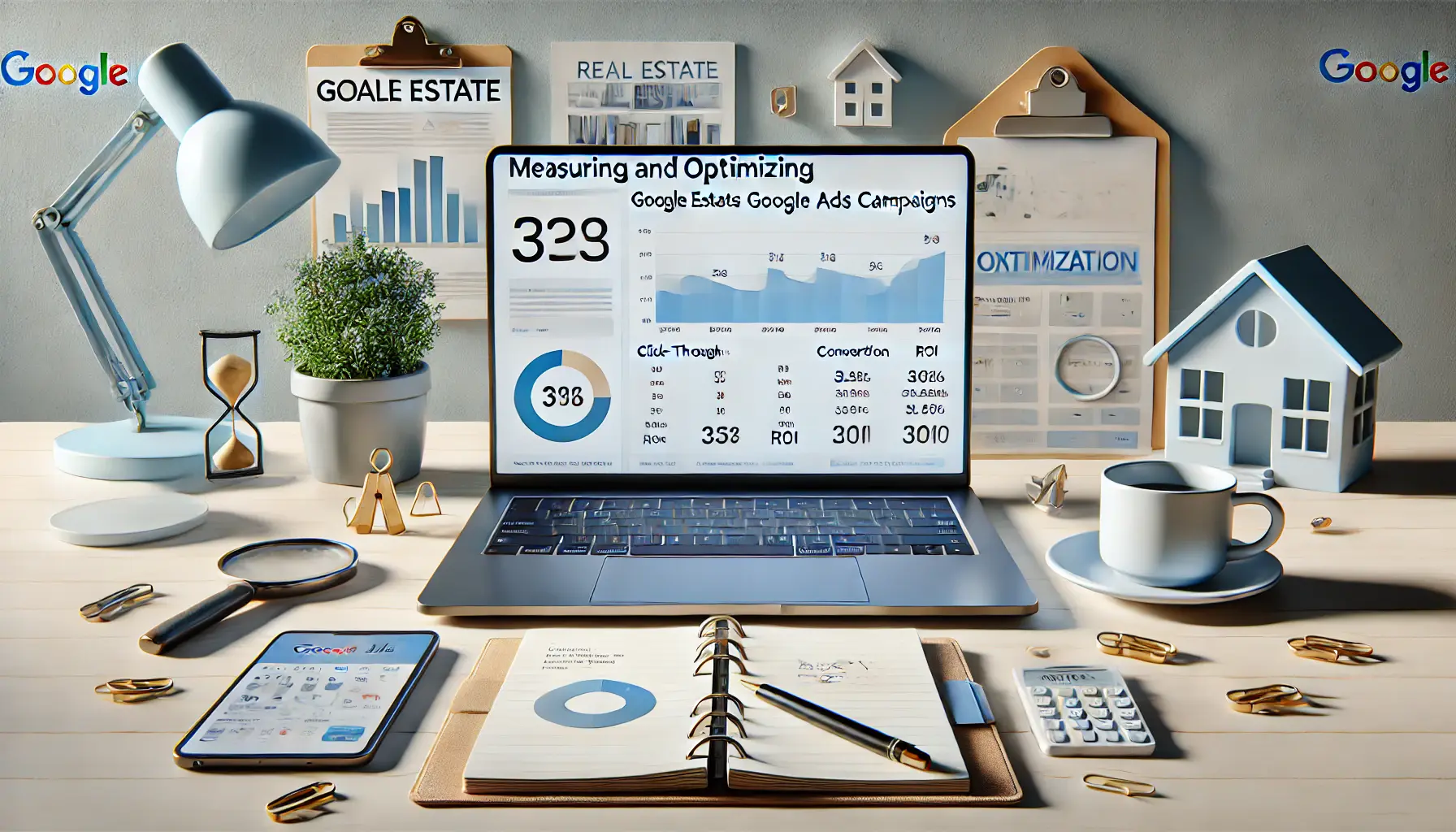
A professional workspace illustrating the process of measuring and optimizing Google Ads campaigns for real estate marketing.
Maximizing ROI and Avoiding Common Pitfalls
Improving ROI requires careful budget management and strategic adjustments.
By allocating resources to high-converting campaigns and minimizing spend on low-performing ones, you can achieve cost efficiency.
Additionally, avoiding common mistakes like neglecting mobile optimization or using irrelevant keywords will ensure your campaigns remain effective and aligned with your goals.
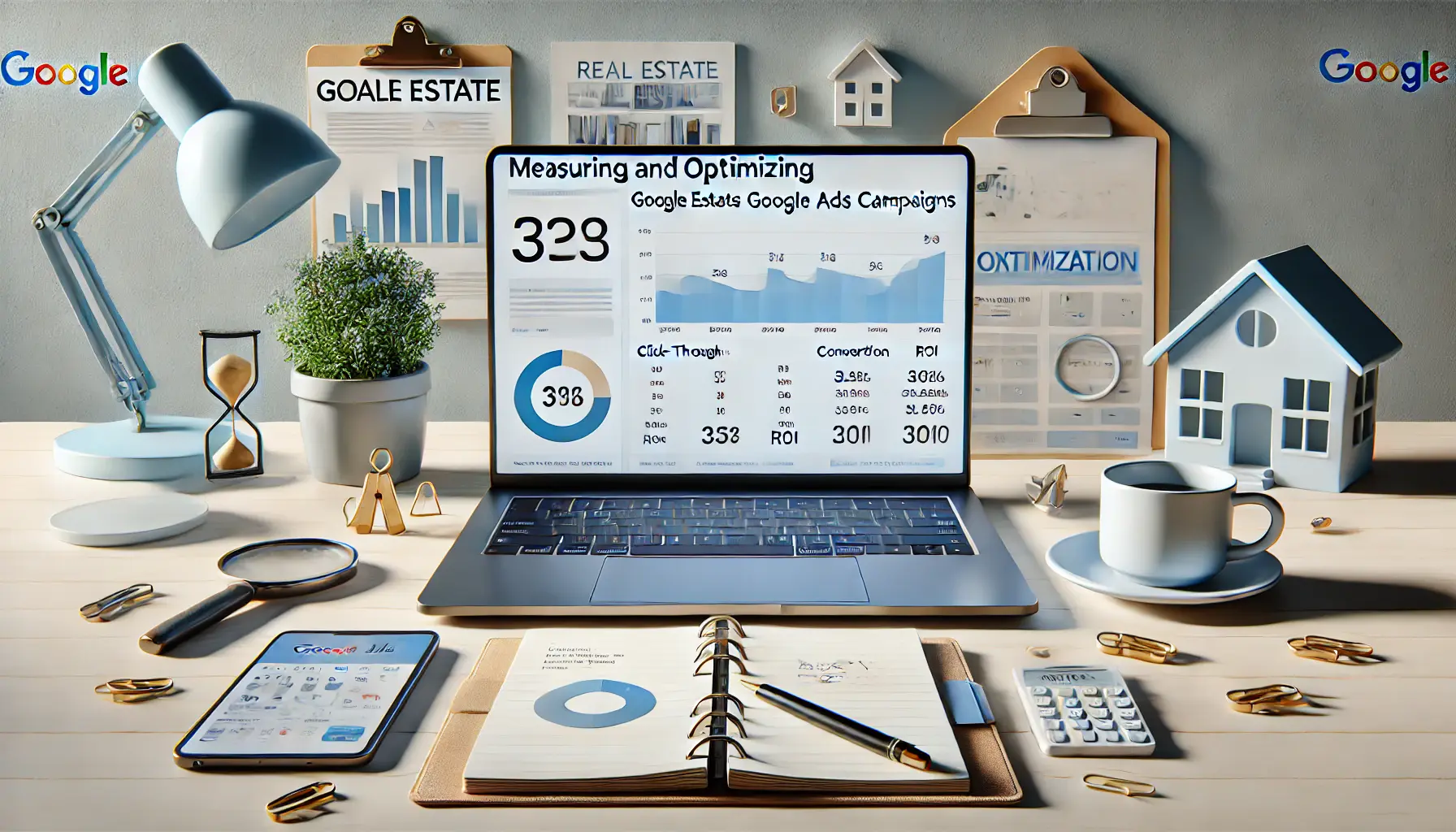
A professional workspace illustrating the process of measuring and optimizing Google Ads campaigns for real estate marketing.
The Future of Real Estate Marketing with Google Ads
As digital marketing evolves, the role of Google Ads in real estate will only grow.
Staying updated on the latest features and trends relevant to the platform will keep you ahead of the competition.
Real estate professionals who learn and optimize their Google Ads campaigns will be better positioned to capture leads, close deals, and build a strong online presence.
By following the strategies mentioned in this article, you can create impactful and successful Google Ads campaigns for real estate.
Whether you’re looking to attract buyers, promote properties, or increase your market presence, Google Ads provides the tools and insights needed to drive measurable results and grow your real estate business.
Consistency in optimization, keyword refinement, and ad copy improvements ensures long-term success in your Google Ads campaigns.
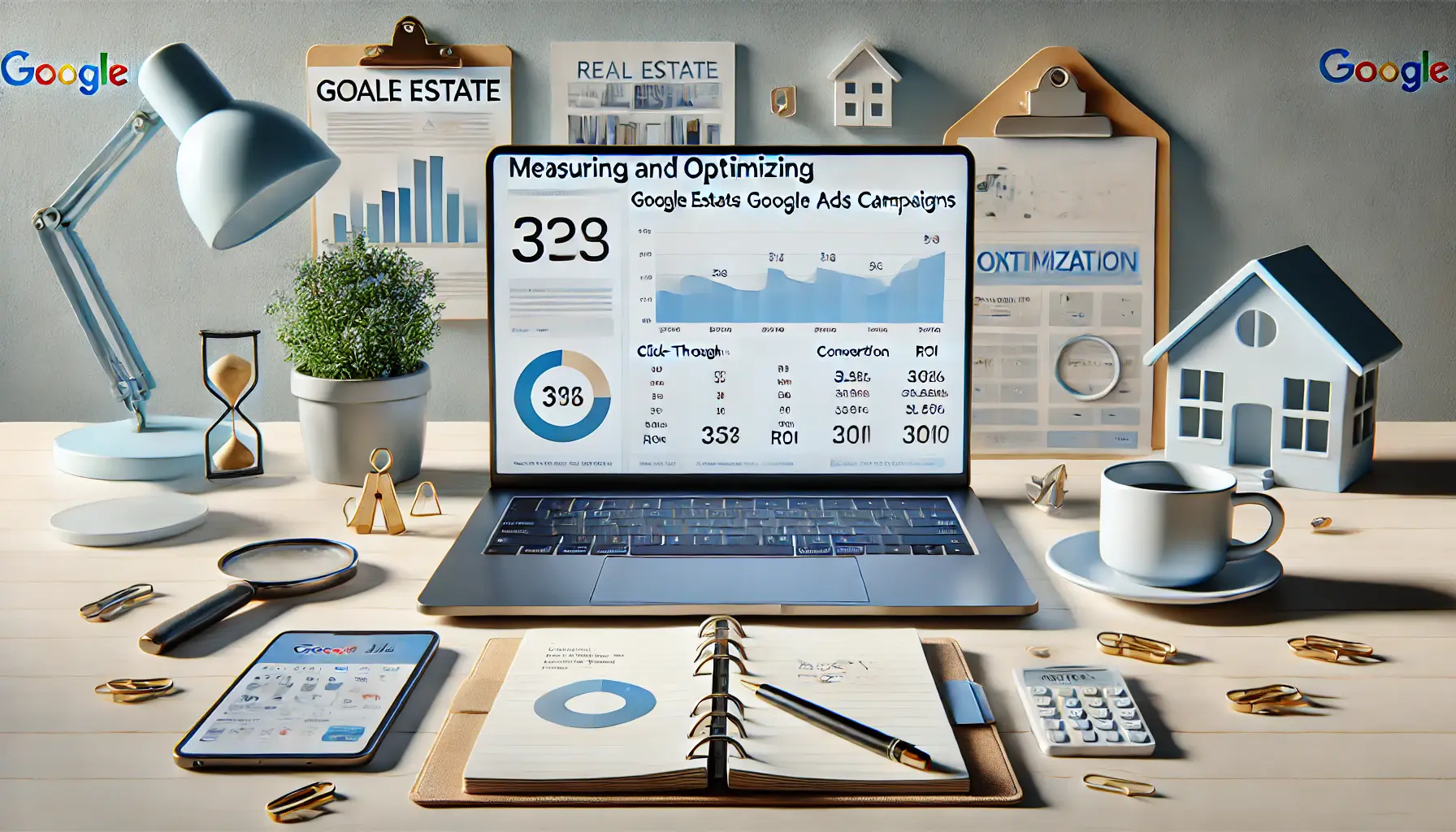
A professional workspace illustrating the process of measuring and optimizing Google Ads campaigns for real estate marketing.
Your campaigns can be managed by an agency specialized in Google Ads, check out our service page.
Commonly Asked Questions About Google Ads for Real Estate
Below are a few of the most common questions about Google Ads for real estate, together with brief answers to further your understanding of this powerful marketing tool.
With Google Ads, real estate agents can reach their desired target market, showcase properties, and measure returns.
It offers tools like retargeting and location-based campaigns to connect with potential buyers effectively.
Budgeting depends on your goals and market competition.
Many start with $20–$50 per day, scaling up as needed.
The flexibility of Google Ads ensures you can adjust your spending based on performance.
Examples of effective keywords include ‘homes for sale near me,’ ‘luxury apartments in [city],’ and ‘real estate agents in [city].’ Mix it up with broad, phrase, and exact match keywords to achieve maximum reach and relevance.
Track metrics such as click-through rate (CTR), cost per click (CPC), conversion rate, and impression share.
Use Google Analytics for deeper insights into user behavior and campaign effectiveness.
Yes, Google Ads features like Local Campaigns and Google Maps Ads are perfect for promoting local listings.
These tools drive engagement from buyers searching for properties in specific neighborhoods or cities.
Regularly refresh keywords, update ad copy, and test to find the best-performing options.
Continuously monitor key metrics, such as CTR and conversion rates, for data-driven changes to optimize performance.
Retargeting enables you to re-engage with previous visitors of your website or ads.
It helps keep your properties top of mind and encourages potential buyers to return and take action.













